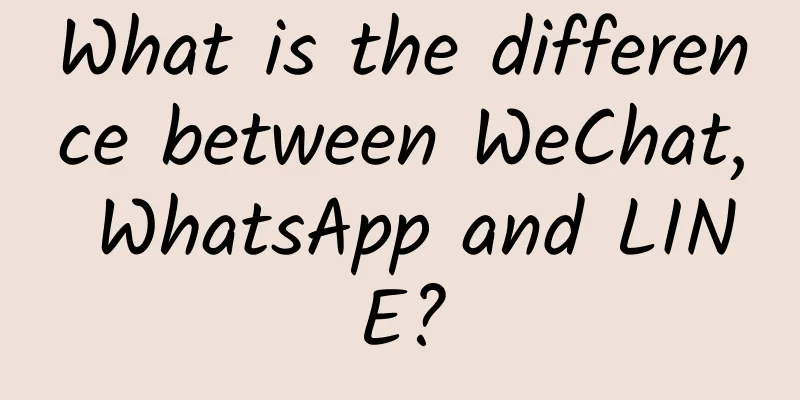What is the difference between WeChat, WhatsApp and LINE?

|
Wang Xing, the founder of Meituan, proposed a theory of "four verticals and three horizontals" in "Nine Failures and One Victory": the four verticals are the four hot areas of the Internet - information, communication (social), entertainment, and business. Among them, the social field has always been a hot spot for Internet entrepreneurship, from PC to mobile terminals, from OICQ, MSN to QQ. When we entered the mobile Internet era, the network and terminals were upgraded and optimized at any time, and the application of the social field exploded completely and entered a golden age. Among the many social products at home and abroad, WeChat in China, WhatsApp in the United States, and Line in Japan are typical representatives, and they have become the three poles of global mobile Internet social networking. On the surface, social products are similar, free information, voice, LBS social networking, address book connection, etc., but behind this surface, there are huge differences in product thinking, business model, and social culture. Product Matrix: WeChat: A large and comprehensive platform In August 2014, Tencent released its second quarter financial report, which showed that the number of monthly active users of WeChat and its overseas version WeChat has reached 438 million, an increase of 11% from the previous quarter and 57% from the same period last year, gradually approaching WhatsApp, which currently claims to have 700 million monthly active users. WeChat was officially launched on January 21, 2011. In just three years, this free software has stood out from Tencent's more than 1,700 products and quickly grown into a social giant, even overshadowing Tencent's core product QQ. The total number of users is currently said to have exceeded 700 million (about 600 million at the end of 2013, but the official has not announced the total number of users later). WeChat has developed into a giant product that integrates social networking, e-commerce, payment, O2O and other products: instant messaging, circle of friends, address book security assistant, QQ mailbox reminder, private message assistant, drift bottle, view nearby people, voice notepad, WeChat shake, group message assistant, Weibo reading, traffic query, game center, JD shopping, WeChat public platform (subscription account, service account, enterprise account), WeChat payment (including payment, financial management, Dianping, lottery, etc.), smart hardware interface, JS SDK interface, etc. According to the current trend, WeChat will connect to more businesses in the future. WeChat has become Tencent's flagship and soul product in the field of mobile Internet, "Tencent's first ticket to enter the mobile Internet", and it has even become a fortress to contain Baidu and Alibaba in BAT. E-commerce has always been a hopeless problem within Tencent, and it is a headache for Tencent. So it used cash and WeChat's traffic advantage to exchange for JD.com's shares. Gaopeng, a group buying business that Tencent invested heavily in, missed the golden period of group buying, and was even dying during the O2O boom period, so Tencent once again used cash and WeChat traffic to invest in Dianping.com. In Tencent's strategic deployment, WeChat has acted as a heavyweight pioneer and pacesetter, winning cooperation and a place for Tencent in many important Internet fields, which shows its weight in the Internet industry. Whatsapp: Small but sophisticated, focusing on communication and social products Jan Koum, co-founder and CEO of WhatsApp, said in January 2015 that WhatsApp's monthly active users have exceeded 700 million. WhatsApp has been positioned as a substitute for mobile text messages since its inception. As long as the other party's mobile phone number is in the mobile phone address book, you can directly leave a message to the other party through WhatsApp. Simplicity is the most obvious feature of WhatsApp: there is no complicated registration process, and users are always online. At the same time, WhatsApp has always adhered to its principles. So far, it has not added features such as emoticons that are popular among young people, and it promises to be permanently ad-free. The product functions are also limited to group or private chats, including voice, text, photos, videos, geographic location, etc. As their corporate culture advocates: "No Ads, No Games, No Gimmicks". Due to the common Latin-speaking cultural background, WhatsApp has a coverage rate of up to 90% of iOS users in Latin America and Europe. Although WeChat (overseas version of WeChat), Line and KakaoTalk have all started overseas expansion, they still face considerable challenges in becoming mainstream applications in these markets. The common cultural background gave WhatsApp a natural advantage in its development in Europe and the United States. At the same time, in some markets deeply influenced by Western culture, such as Hong Kong, China, and India, WhatsApp is one of the main IM tools used by users. However, in Taiwan, China, WhatsApp, which initially developed smoothly, encountered the free Line and its market share dropped significantly. When talking about the Taiwan market, co-founder Brian said, "We changed our business model in Taiwan and implemented free, but we have lost the opportunity." The biggest difference between WhatsApp and the other two apps is that it is a paid app. After registering, users can try it for free for one year, and then it will be charged $0.99 per year. This is a huge barrier for Chinese users who have no habit of paying. Although the paid period was extended again after the announced period, this is also one of the reasons why the number of Chinese users is relatively low. When WeChat and Line vigorously expanded their overseas markets, it also had an impact on WhatsApp. On February 19, 2014, Facebook announced that it would acquire WhatsApp for approximately $19 billion. This caused an uproar in public opinion. Regardless of whether it was a good deal, it fully demonstrated the importance of WhatsApp in the global mobile Internet. The purpose of the acquisition was not only to integrate the advantages of both parties in the field of instant messaging and develop more user groups, but also to greatly reduce Facebook's time cost and potential risks in seizing the mobile Internet market share. Line: Distinctive personality, cluster strategy Line was launched in June 2011. It was launched by NHN Japan, a subsidiary of South Korea's NHN. As of October 9, 2014, LINE had 560 million registered users. LINE's global monthly active users reached 170 million. In addition to the 54 million users in Japan, its home base, Thailand, Indonesia, Spain and Taiwan are all important bases for LINE. The rapid development of Line has a lot to do with Japan's mobile phone and network environment. Japan is one of the fastest growing regions in the world for 4G and mobile Internet. Softbank, Japan's third largest telecommunications operator, has vigorously developed free WiFi and launched preferential monthly packages, allowing users to transfer unused data traffic of the current month to the next month. This series of measures has laid the foundation for users to conveniently use mobile phones to access the Internet, making the mobile Internet industry explode in Japan. The biggest feature of Line is chat emoticons. The elements of entertainment and gamification have become one of the key elements that are popular among young people. Various cute and silly emoticons, totaling more than 250, have become the best tools for expressing feelings and communicating. The most representative ones are the steamed bun man, Cony rabbit, and Brown Bear, which have become the important symbol of Line that distinguishes it from other communication and social software. Line has entered China and other overseas markets, but it is now inaccessible in China for well-known reasons. Line's products adopt a matrix-style cluster strategy, which is different from the simple simplicity of WhatsApp and the large and complex platform style of WeChat. As Line develops rapidly, its peripheral derivative products also spread rapidly, but unlike WeChat, they are not mixed in a platform, but are independent products. Currently, Line includes free calls, free text messages, 24-hour online, rich stickers and emoticons, background change, group chat. Peripheral applications include LINE Card greeting cards, LINE Camera camera and picture beautification applications, LINE game LINE Birzzle, LINE Channel open platform, LINE Brush painting application, LINEPOP, LINE Tools, LINE PLAY, location and interest group social application LINE café, LINE Bubble, LINE IceQpick, LINE ZOOKEEPER three social games, antivirus application LINE Antivirus, private social circle application LINE BAND, LINE weather release, comic reading application LINE Manga and dozens of other applications. At present, many applications including LINE Camera have more than 10 million users. As Frank Lee, director of Line Greater China Business Unit, said: "Line hopes to give users the right to choose." Business Model: WeChat: Attacking from all sides, eager to cash in Since Tencent won the top spot in the domestic Internet industry, it has been relying on the continuous monetization of its two major businesses, QQ and games, to maintain its annual performance growth and stock price rise. At this stage, the original business has limited room for growth and insufficient momentum. The new cash cow, WeChat, is responsible for the internationalization and mobility of the Tencent Group. Whether it is commercialized or to what extent, many things are no longer controlled by the WeChat division. WeChat has 438 million monthly active users and over 700 million total users. With such a big piece of fat meat in front of Tencent, the shareholders are probably already scratching their heads and eager to cash out. WeChat has tried various monetization attempts such as game distribution, traffic export, financial products, and paid stickers, and the results are good. But compared with information flow advertising, these are just a piece of cake. Information flow advertising is the dominant form of mobile advertising revenue. In 2014, Facebook's advertising revenue exceeded US$5.5 billion, with mobile advertising accounting for more than 66%. In contrast, in Tencent's latest third quarter 2014 financial report, advertising revenue was 2.44 billion yuan, accounting for only 12% of total revenue. In 2014, Tencent attached great importance to the advertising business and took measures such as establishing a unified advertising system. Tencent's advertising revenue in Q2 2014 increased by 75% month-on-month. Having tasted the sweetness, Tencent will naturally not stop. The revenue from WeChat advertising flow is expected to reach more than 10 billion yuan per year. However, the overly large WeChat has gone far from the fun and interestingness of the early days. The advertising information flow that has been opened in the Moments will further reduce the stickiness and entertainment of WeChat. WeChat shoulders the multiple tasks of Tencent's strategic transformation and global expansion. Further commercialization is inevitable, and utilitarianism is the natural enemy of fun. Up to now, WeChat is no longer Zhang Xiaolong's WeChat, or even Ma Huateng's WeChat. The company's profit pressure and the ever-changing mobile Internet have forced the entire WeChat to accelerate commercialization. No matter how high your sentiments are, they cannot beat the profit target! Line: Blossoming everywhere, with impressive results In Line's business model, collecting money through unique emoji stickers is the most direct way to monetize. According to Frank Lee, when users chat on Line, one in every six sentences contains emoji stickers. In 2014, Line's emoji sticker revenue exceeded $10 million per month, and this revenue is still growing. At the same time, the Line app has opened official accounts and advertisements for companies and celebrities, which is also an important source of income. It is similar to WeChat's public account. However, in stark contrast to the free and open status of WeChat's public platform, Line implements strict review and harsh management on this account. The official principle is that "by setting certain thresholds, the reliability of official accounts can be guaranteed and fraud incidents can be prevented." For example, in China, it costs nearly 2 million yuan (300,000 US dollars) to register an official Line account. Each company can only register one official account, and it must pass Line's review and certification. This is destined to be a game for large companies like Coca-Cola. However, with domestic users unable to access the server, the recovery of this business is out of reach. In addition, the rapid growth of the game business has become LINE's core revenue, accounting for more than 50%. As the main source of revenue, LINE's new games launched in 2014, such as LINE Cookie Run, LINE Rangers, LINE Disney Tsum Tsum, etc., have performed well in terms of user numbers and revenue. In addition, LINE is also actively expanding its international revenue sources. Whatsapp: Single model, slow monetization According to data released by Facebook, WhatsApp lost $230 million in the first half of 2014, with revenue of only about $15 million. WhatsApp's revenue is quite simple, mainly from the annual price of $0.99. In Taiwan and other regions, it even implemented a free strategy. WhatsApp co-founder Jan Koum said: "After Facebook acquired WhatsApp, WhatsApp slowed down its commercialization plan." Faced with competition from WeChat in China, Line in Japan, and Snapchat in China, postponing commercial monetization will help them focus on products and provide better services to users. However, after being incorporated into a listed company, with over 1 billion users and 700 million monthly active users, monetization is just a matter of minutes. It has become Facebook's trump card in the mobile Internet field. How to play this card well and monetize without damaging the experience and users is naturally a matter of great caution, but it is estimated that it will not take too long. After all, after the sky-high transaction, it is responsible for shareholders and financial statements. Cultural Background: WeChat: A comprehensive culture Zhang Tao, a product manager of an IM application, once wrote an article to evaluate the domestic Internet culture, "Mobile APPs should not pursue big and comprehensive, and must not become Swiss Army Knife." But it happens that big and comprehensive is one of the important cultures and tones in various fields in China, including the Internet. Why do domestic applications and entrepreneurs like this "big" form? On the one hand, it is related to traditional culture. From ancient times to the present, our culture has worshipped great culture. The names of the Han Dynasty, the Tang Dynasty, and the Qing Dynasty reveal this psychological "big" habit. Now, government buildings, halls, and even companies and schools all pursue various big things. This culture deeply affects everyone on this land. On the other hand, becoming big is closely related to valuation. According to the actual market value of Internet listed companies and investment industry rules, the valuation of application-level companies is generally US$1 billion, platform-level companies (such as Qihoo 360) will be US$10 billion, and ecosystem companies (such as Tencent, Alibaba, and Amazon) will reach US$100 billion. Therefore, if you want to get a high price and make a lot of money, you must go big, the bigger the better. Even when running a WeChat pyramid scheme, the marketing masters are all using titles such as "the world's largest WeChat business alliance". When China's Internet came into this world, every pore pursued the goal of being big and comprehensive. Walking on the entrepreneurial street of Zhongguancun in Beijing, if you don't claim to be a platform or an ecological chain, you are embarrassed to say hello to others! WeChat is an extremely rare case that has truly developed into a benign ecosystem. This is closely related to Tencent's years of accumulation and resources, Zhang Xiaolong's feeling and control of the product, WeChat's strategic position, etc. It is completely unreplicable! Whatsapp: Puritan Culture In sharp contrast to WeChat is WhatsApp, which goes the other way, pursuing simplicity above all else and taking minimalism as its principle. And it has always adhered to it. This is closely related to Puritanism in American culture. Puritans are not a sect in the strict sense, but an attitude, a tendency, and a value. Puritans are the spokespersons for entrepreneurial spirit, and they believe that moderation is necessary. As a unique source of American culture, Puritanism has profoundly influenced American society, laid the foundation of American culture, and forged the soul of the American nation. "Without understanding American Puritan thought, it is impossible to understand American society." This culture is particularly evident in American entrepreneurs and entrepreneurial projects. In addition to WhatsApp, the star project in recent years is Snapchat, a photo-sharing application developed by two Stanford University students that is “burned after reading”. This application is currently valued at more than 20 billion US dollars, and the number of monthly active users has exceeded 100 million. For a long time, it was not in a hurry to develop in the direction of platformization, and it was not as eager to divert traffic and diversify as domestic applications, and it has always maintained its early product features. However, according to media speculation, it plans to transform to a mobile platform in the future. Even if this is true, it will only start to transform and consider it after it has enough volume. There are many cases like this in the United States. Line: Cute comic culture It is no surprise that LINE, which quickly became popular with its emoji stickers, was born in Japan, a country known for its cute comic culture. Cute culture (Japanese: 萌え) originated in Japan and was developed and spread overseas. Japan is a comic powerhouse and enjoys an absolute first place in the world. The Japanese comic industry has a long history and is very developed. It began to sprout and develop in the 12th century. According to a survey by Mitsubishi Research Institute, 87% of Japanese people like comics and 84% of people own items related to comic characters. There are hundreds of high-quality animation production companies in Japan, with a group of world-class comic masters. With the popularization and development of mobile Internet, the convenience and optimization of comic dissemination channels and means, the further development and growth of Japanese anime culture, the influence of Japanese anime works in the cultural market has become greater and greater. This influence has naturally spread to the Internet and mobile Internet fields and has become popular all over the world. Line was born in this environment. South Korea, which has a close connection with Japanese culture, has also given birth to cute social applications such as Kakaotalk. |
<<: Behind WeChat’s crazy “ban”: the pain of WeChat Pay
>>: Microsoft releases Windows 10 mobile preview to support six Lumia models
Recommend
Survival within the system "The director of the red dust talks about the way to promotion" 2021 annual member
Survival within the system "The Director of ...
Drink bone soup to supplement calcium? This article tells you how effective it is
Can bone soup provide calcium? The calcium in bon...
Duang! A complete collection of self-study Android materials
[[128183]] Text/Tikitoo I have learned Android fo...
Who are the most popular iOS and Android developers? Microsoft is one of them
[[266402]] Perhaps it is because the Windows Phon...
4 steps to quickly increase your conversion rate!
First of all, what is the growth we want to talk ...
Sea Fog: I am not an ordinary fog!
Produced by: Science Popularization China Author:...
Why do many people think Mona Lisa is smiling?
Leviathan: This woman has been watched by countle...
Spring Festival Gala magician's "Lung Cancer Escape Guide": A must-see for high-risk groups! These life-saving tricks are more exciting than magic
After last year's Spring Festival Gala, the m...
Unveiling the secrets of "Xihe"! my country's first solar exploration satellite was successfully launched!
At 18:51 Beijing time on October 14, 2021, my cou...
Why is it that the articles you write are very valuable but no one reposts them?
Take “Cool Play Lab”, an article with over 100,000...
If you find an illegal mini program, how do you report it?
Q: How do I report a mini program? Or can someone...
Why mosquitoes aren't going away? Here's some good news and some bad news
"Buzz, buzz, buzz..." One of the nightm...
Shared power bank mini program has customized functions. How much does the shared power bank mini program cost?
With the advent of the 5G era, the network speed o...
A brief discussion on how to attract new customers in K12 education
This time, the author started from the entry poin...
Teasing Microsoft Cortana, it will answer you like this
Microsoft's personal voice assistant Cortana i...









